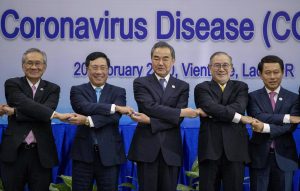Southeast Asia’s top diplomats praised China’s handling of the virus outbreak and pledged Thursday to help fight the disease that emerged in a central Chinese city and spread in the region and around the world.
Chinese Foreign Minister Wang Yi highlighted the unprecedented steps his country has taken to contain the two-month outbreak in an emergency meeting with his Southeast Asian counterparts. He pointed to signs the outbreak may be starting to ease.
Laos, a close China ally, hosted the meeting between China and the Association of Southeast Asian Nations (ASEAN) in its capital, Vientiane.
Wang and his fellow ministers locked arms in a traditional show of solidarity before TV cameras and photographers at the start of the session. They then applauded and cheered, “Stay strong Wuhan, stay strong China, stay strong ASEAN,” referring to the Chinese city where the virus emerged in December.
“We reached an important consensus on China and ASEAN joining hands to fight against the epidemic,” Wang told journalists after the meeting. “We agreed to stand united and stay confident and support each other in this time of difficulty.”
Wang and the ASEAN foreign ministers did not take questions after reading their statements. They outlined steps to collaborate better, share timely information and techniques, and align actions to fight the disease, which the World Health Organization has labeled COVID-19.
Wang proposed a summit on the outbreak for Chinese and ASEAN leaders to underscore regional cooperation, but two Southeast Asian diplomats told the Associated Press that no consensus was reached on the idea. The diplomats spoke on condition of anonymity because they did not have authority to discuss the matter publicly.
More than 75,000 people have been infected globally with more than 2,100 deaths, mostly in China. Six countries in the 10-nation ASEAN bloc have confirmed cases of the virus.
Wang indicated that the situation in Wuhan and surrounding Hubei province has been brought under effective control and expressed confidence that China can “secure an early victory against this outbreak.”
Wang made the assurances days after ASEAN leaders expressed alarm over the outbreak in a joint statement. He stressed that economic losses arising from the viral crisis could be overcome and China would recover.
“The outbreak may have taken a toll on economic cooperation between China and ASEAN countries but such an impact can be overcome and made up,” Wang said. “The Chinese economy has strong driving forces and is highly resilient and the long-term positive trajectory will remain intact.”
China was praised for sharing information about the virus that allowed other countries like Singapore to develop test kits early. The Chinese government has also placed cities around Hubei with a combined population of more than 60 million under lockdown and taken other unprecedented steps to contain infections.
Those steps followed public outrage over Hubei authorities’ handling of the outbreak when it began, including playing down the risk of human-to-human transmission. Doctors who tried to warn the public were reprimanded by police.
Many countries have set up border screenings and airlines have canceled flights to and from China to prevent further spread of the disease, which has been detected in about two dozen countries. Within ASEAN, countries such as Indonesia, the Philippines and Vietnam have temporarily suspended flights to and from China.
Jim Gomez for the Associated Press.
Associated Press journalists Yves Dam Van and Sakchai Lalitkanjanakul contributed to this report. With additional reporting from The Diplomat.

































